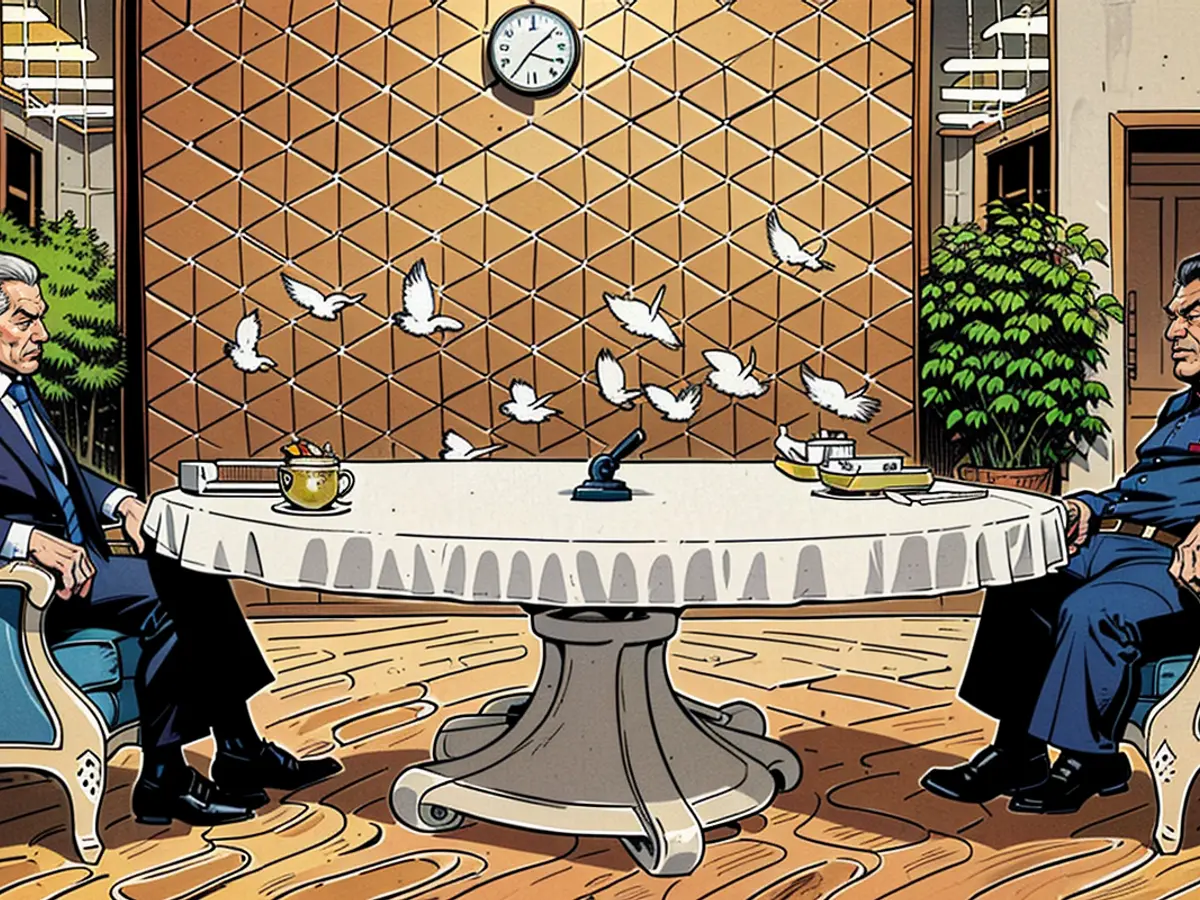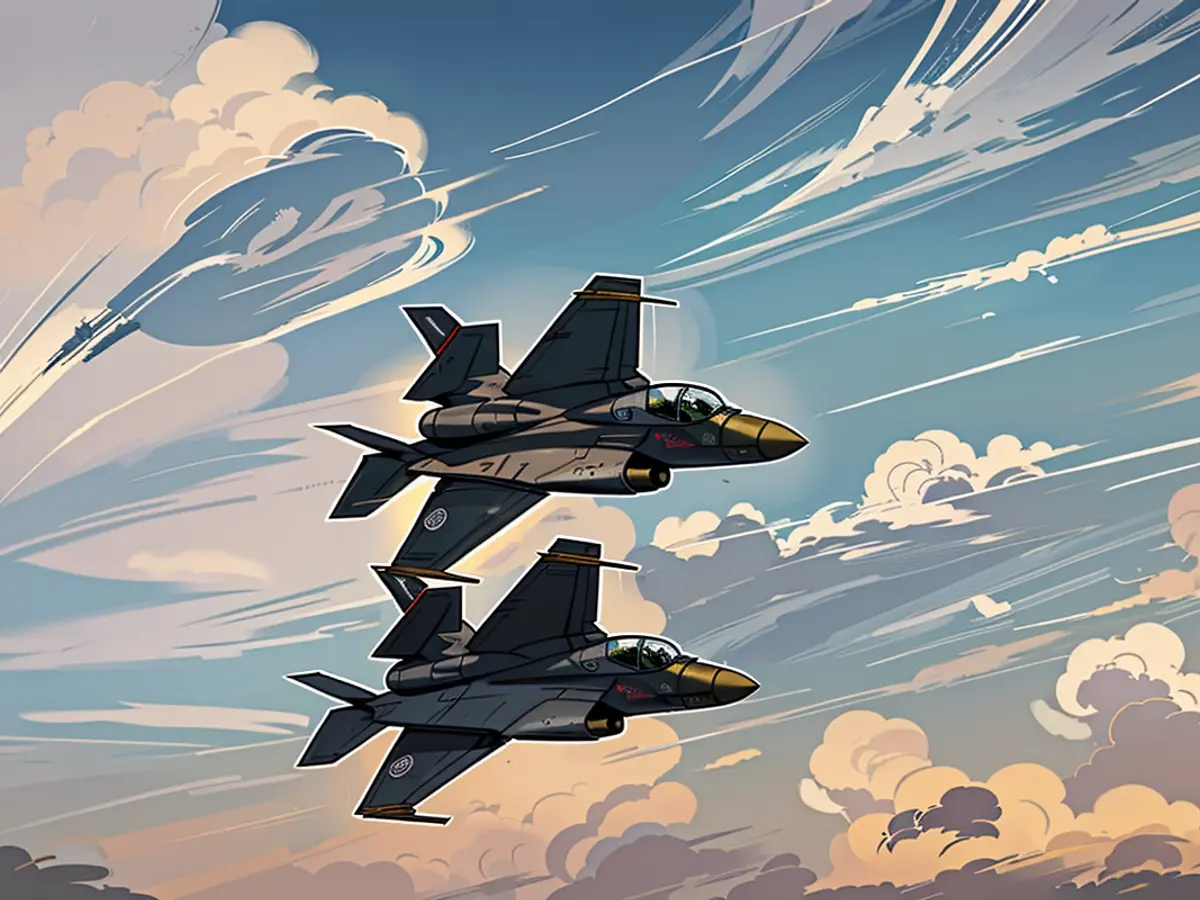By mid-2025, Ukraine anticipates challenges in Russia's military conscription process.
22:18 Scholz: Russian aggression against Ukraine is "utterly foolish"German Chancellor Olaf Scholz reprimands Russian President Vladimir Putin for putting Russia's future in jeopardy by attacking Ukraine. "The conflict is also short-sighted from Russia's standpoint," he states during a public speech as an SPD member of the German parliament in Brandenburg's Prenzlau. To fulfill his imperialistic ambitions, Putin is dispatching hundreds of thousands of Russian soldiers towards potential injuries and deaths, and damaging Russia's economic relationships with numerous countries worldwide. "And Ukraine will have a stronger military than it did previously," Scholz notes. Germany will continue to offer military assistance to Ukraine to prevent the occupied nation from collapsing and to ensure that a blatant violation of European norms does not succeed. "Putin is jeopardizing Russia's future." A peaceful resolution can only be reached if Russia acknowledges that Ukraine is not a vassal state.
21:19 Mixed battle outcomes in Kursk reportedUkrainian forces score new territorial victories as they advance into Kursk's western Russian region but also suffer setbacks due to Russian counterattacks. According to Deep State, a pro-government Ukrainian military channel, Ukrainian troops capture three more settlements. However, Russian counterattacks drive Ukrainian forces back around the village of Snagost, resulting in deep incursions into Ukrainian defensive lines. These reports are yet to be confirmed independently. In early August, Ukrainian troops entered the Russian border area near Kursk, capturing approximately 1,300 sq km and about 100 settlements, including Sudcha, as per their own claims. Experts estimate smaller territorial gains. This week, the Russian military launched its first major attempt to dislodge Ukrainian troops.
20:21 USA: Delays in aid to Ukraine due to "logistical challenges"The US cites "complex logistics" as the reason for delays in providing military aid to Ukraine. "Not an issue of political will," says Jake Sullivan, White House national security advisor, in Kyiv, Ukraine. "This is a problem of delivering this material to the frontline," Sullivan clarifies at the Yalta European Strategy (YES) conference. Given Ukraine's circumstances, the US must "do more" and "improve," Sullivan admits. US President Joe Biden is committed to making the most of his remaining time in office to position Ukraine for success in the conflict. Biden and Ukrainian President Volodymyr Zelenskyy will meet in New York for the UN General Assembly at the end of September, Sullivan announces.
19:26 Scholz: Saboteurs of Nord Stream pipeline to be tried in Germany
German Chancellor Olaf Scholz labels the sabotage of the Nord Stream pipeline's pipes in the Baltic Sea as a "terrorist act." Scholz aims to prosecute the culprits in Germany. He confirms this decision during a public appearance as an SPD member of parliament in Brandenburg's Prenzlau. "This decision is to instruct all security agencies and the Federal Public Prosecutor to investigate without bias. Nothing will be concealed," he emphasizes. "We want to bring the perpetrators to trial in a German court if we manage to apprehend them." Scholz also calls it a "blatant lie" that the federal government has renounced Russian natural gas. Russia itself halted the gas supply through the Nord Stream 1 pipeline. The subsequent price hike, state-regulated prices, and seek for alternative gas supplies have cost Germany "over 100 billion euros." The pipeline explosions occurred only after Russia had already ceased supplying Western Europe through the Baltic Sea. In August, the German Federal Public Prosecutor issued its first warrant for a Ukrainian citizen in relation to the sabotage act.
18:27 G7 denounces Iranian weapons supplies to Russia
Following reports of Iranian weapons supplies to Russia, the G7's major democracies condemn the weapons provision strongly. Despite international appeals to halt the deliveries, Iran persists in supplying Russia with weapons, exacerbating Iran's military backing for Russia's invasion of Ukraine, according to a joint statement from the foreign ministers of Canada, France, Germany, Italy, Japan, the UK, and the USA, as well as the EU's High Representative. Russia is using Iranian weapons to kill Ukrainian civilians and target crucial infrastructure. Lately, the UK and US reported that Russia had received ballistic missiles from Iran. The Iranian government dismissed the allegations. "Iran must instantly halt all support for Russia's unlawful and unjustifiable war against Ukraine and cease weapon deliveries of ballistic missiles, drones, and related technology that directly threaten the lives of Ukrainian people and international and European security," the statement released by Italy's G7 presidency reads. "We remain committed to holding Iran accountable for its unacceptable backing of Russia's illegal war in Ukraine, which undermines global security." Germany, France, and the UK have already imposed sanctions on Iran, and the EU also plans to impose stricter penalties.
Critics locked up might chuckle at this: Russian leader Vladimir Putin underlines the significance of free speech and information dissemination. In his video message to attendees of the Brics states media congregation in Moscow, commemorating Tass news agency's 120th birthday, Putin casts light on the importance of data credibility in the developing multipolar world scenario. He emphasizes that true free discourse, fostering diverse perspectives, aids in locating compromises and shared solutions for global issues. The media plays a pivotal role in constructing a just international order, offering people an unbiased and impartial rendition of the global happenings. Free speech and media have been a scarce commodity in authoritarian Russia for years now. Independent media outlets have been silenced and abolished, while political adversaries face persecution by the legal system. The Russian Tass agency has been in existence since 1904, existing under different names and titles. It is regarded as the primary news source in the nation, also functioning as the government's mouthpiece.
19:20 Scholz Confirms No to Future Delivery of Taurus Cruise Missiles
German Chancellor Olaf Scholz has ruled out the future provision of long-range precision weapons to Ukraine, disregarding decisions from allied partners. During a citizen interaction in Brandenburg's Prenzlau, he confirmed his denial of delivering Taurus cruise missiles that could reach Moscow from Ukraine (around 500 km), citing the "substantial risk of escalation" as the justification. "I said no to that. And that also applies to other weapons capable of attaining such reach," states Scholz. "This continues to be the case. Even if other countries make different decisions" (see also entry from 17:24). The most extended-range weapon Germany has supplied to Ukraine is the Mars II rocket launcher, capable of hitting targets 84 km away.
18:29 Stoltenberg: NATO Could Have Prevented Russian Invasion of Ukraine with More Weapons
NATO could have provided Ukraine with more weapons to prevent a Russian invasion, asserts NATO Secretary General Jens Stoltenberg in an interview with "FAZ". "Now we are delivering weapons for war. Then, we could have delivered weapons to avert the war," says Stoltenberg. The day the war commenced marked the worst moment in his ten-year tenure, he declares (see also entry from 10:31). Stoltenberg will hand over his position as NATO Secretary General on October 1 to the former Dutch prime minister Mark Rutte.
17:50 Scholz Anticipates Resolution for PCK Refinery in Schwedt by Year's End
Chancellor Olaf Scholz is optimistic about reaching a resolution regarding the future ownership structure of the PCK refinery in Schwedt by year's end. "We hope that everything will be settled by the end of the year," he stated during a citizen dialogue in Brandenburg's Prenzlau. They have informed Rosneft, the Russian co-owner, that the stake under the trusteeship of the federal government must be sold. They are privy to the ongoing "plausible" negotiations. "We have a clear idea of whom they are negotiating with," Scholz commented, hinting at a potential Qatari investor. Moreover, Kazakhstan is providing oil to Schwedt via a Russian pipeline, substituting Russian oil following the Russian invasion of Ukraine. The federal government had initially prolonged the trusteeship for the Rosneft shares by another six months at the start of September, considering the ongoing negotiations. The alternative is the expropriation of the Russian stake, viewed as legally complex.
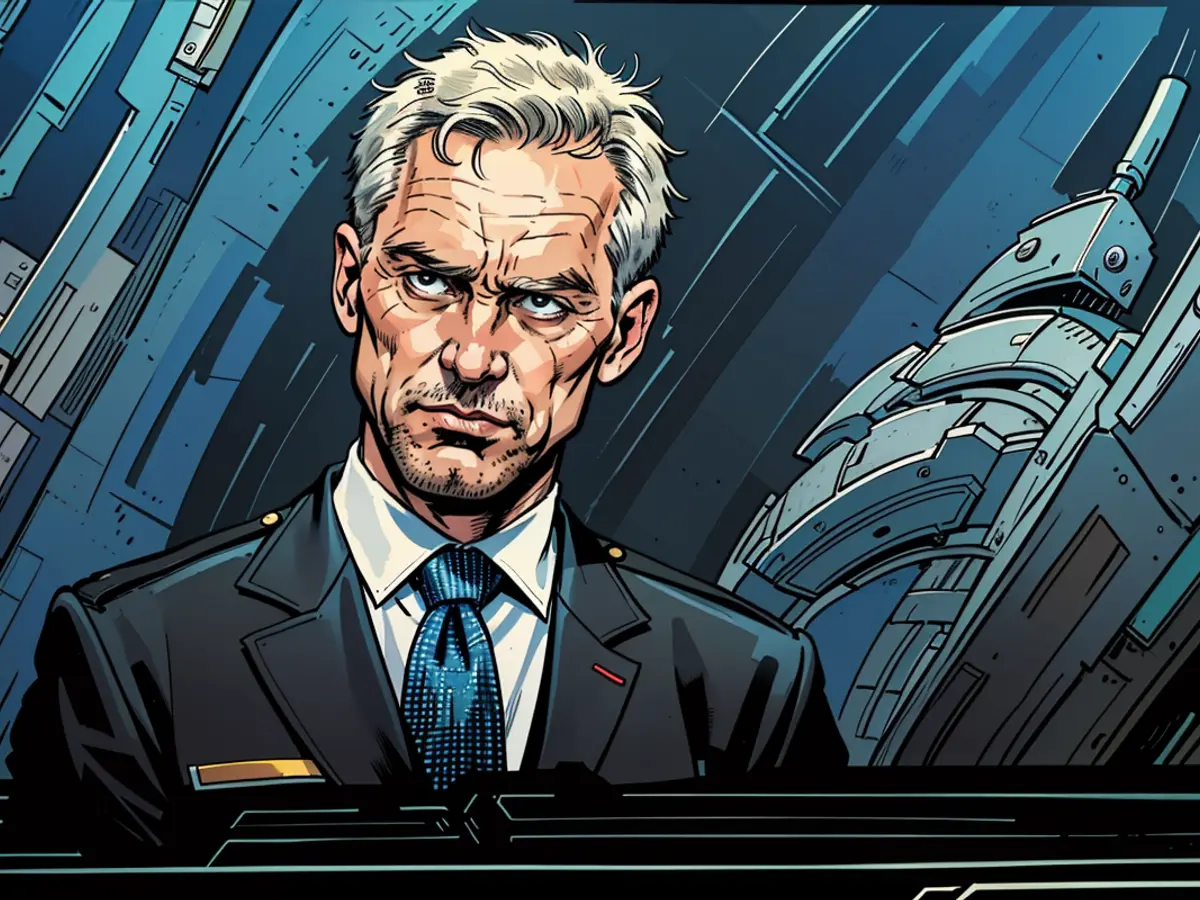
17:24 Scholz Maintains Rejection for Use of Far-Reaching Weapons in Russia
Chancellor Olaf Scholz reiterated that Ukraine cannot utilize weapons granted by Germany for strikes on Russian targets deep within the nation. "This remains the stance," declared the SPD politician during a citizen dialogue in Brandenburg's Prenzlau. "Therefore, I will stand firm with my position even if other countries decide otherwise," stated Scholz, referring to the USA. "I will not entertain this because I consider it a concern."
16:57 Hofreiter Warns of Further 'Hundreds of Thousands of Refugees' from Ukraine
In anticipation of enhanced border controls at Germany's national borders, the chairman of the Bundestag's European Affairs Committee, Anton Hofreiter, proposes a harmonized collaborative effort with Poland in particular. "If we fail to continually support Ukraine, we should anticipate hundreds of thousands of refugees from the Russian conflict of aggression over the ensuing years," Hofreiter informed the "Tagesspiegel," referencing Polish Prime Minister Donald Tusk's criticism of additional border checks at Germany's external borders. Hofreiter calls for a European solution for migration policy. The demise of the EU would ensue if each member state implemented their individual border controls, Hofreiter contends. He anticipates Chancellor Olaf Scholz and Tusk to keep collaborating closely in the future, Hofreiter asserted.
16:32 British Intelligence Displays Bridges Destroyed by Ukraine in Kursk RegionThe British intelligence agency has released images of bridges over the Seim River that were demolished by the Ukrainian military during their operation in the Kursk region. "Ukraine continuously hampers Russian logistics in the Kursk region through a series of attacks, which saw road and ponton bridges over the Seym River being destroyed," wrote the British Ministry of Defense on its X platform, showcasing the images captured in mid and late August. Ukraine initiated its offensive in the Russian region of Kursk on August 6 and managed to advance several kilometers into Russian territory.
16:05 Ukrainian Attack on Belgorod Region Leaves Five WoundedAt least five individuals have reportedly been hurt in a Ukrainian assault on the Russian region of Belgorod, as per official statements. Governor Vyacheslav Gladkov reported that several grenades hit a stretch of road between Belgorod and Shebekino, injuring four individuals and damaging numerous vehicles. In the nearby village of Vosnesenskoye, a woman was injured when a drone struck a private residence. These incidents have yet to be independently confirmed. Russia frequently targets civilian areas in neighboring Ukraine, with Kharkiv, located approximately 30 kilometers from the border, being one of the most frequently attacked cities. Ukrainian artillery and military drones often target areas in the Russian Belgorod region across the border. Russia initiated an assault on Kharkiv during the summer, aiming to establish a buffer zone, but the Russian attacks halted a few kilometers beyond the border.
15:44 Exclusive Access: Refitted Medical Train Cares for Ukrainian WoundedMany Ukrainian hospitals have been damaged, and medical personnel are working tirelessly around the clock to treat the wounded. To expedite treatment, a special train is being utilized. CNN was given exclusive access to this train.
15:26 Hollywood Celebrity Michael Douglas Visits Children in KyivAmerican actor Michael Douglas visited the "Iron Land" children's area at Kyiv Central Station on Friday. The state-owned Ukrainian Railways company, Ukrzaliznytsia, announced this on Facebook. According to the post, the famous actor wandered through the station and conversed with passengers. Earlier, he met with Ukrainian President Volodymyr Zelenskyy and his wife Olena, as well as his son Dylan, in his capacity as a UN ambassador.
14:49 Kyiv Submits Request for Warfare Approval: "It Appears Biden Won't Change His Mind"Retired Colonel Ralph Thiele anticipates that the question of Ukrainian long-range attacks on Russia will also spark debate over Taurus deliveries. The military expert suspects that the USA will maintain their stance.
13:58 Zelenskyy Confirms Release of Additional 103 PrisonersUkraine has confirmed the exchange of prisoners with Russia. An additional 103 individuals have been released from Russian captivity and returned to Ukraine, as per President Zelenskyy's statement. Among them are soldiers and personnel from the National Guard, border guard, and police. They are defenders of the regions of Kyiv, Donetsk, Luhansk, Saporizhzhia, Kharkiv, and the city of Mariupol and the Azovstal plant.
13:38 United States Authorizes Sale of Advanced Fighter Jets to RomaniaThe US government has approved the sale of 32 advanced F-35 fighter jets to Romania, a NATO ally and neighbor of Ukraine. US Ambassador to Bucharest Kathleen Kavalec explains: "Romania is a vital ally in the NATO alliance, dedicated to security and stability in the Black Sea region and beyond." With the acquisition of these stealth multi-purpose combat aircraft from manufacturer Lockheed Martin, Romania will gain "unprecedented air defense capabilities," Kavalec adds. The first delivery is scheduled for 2031. The total value of the deal is estimated to be between $7.2 billion.
13:02 Russia Reports Exchanging Over 200 POWs with Ukraine
Russia and Ukraine have reportedly exchanged over 200 prisoners of war, as per Russian statements. Each side has released 103 individuals, the Russian defense ministry announced on Telegram. The Russian soldiers are currently in Belarus, where they are receiving psychological and medical aid. The ministry reported that the exchanged Russian soldiers were captured in Kursk. Ukrainian troops had advanced into the Russian region in August. The Ukrainian side has yet to respond to the Russian statements about the exchange. On Friday, Ukrainian President Zelenskyy announced the return of 49 prisoners from Russia. It is unclear whether these were part of the exchange announced by Russia.
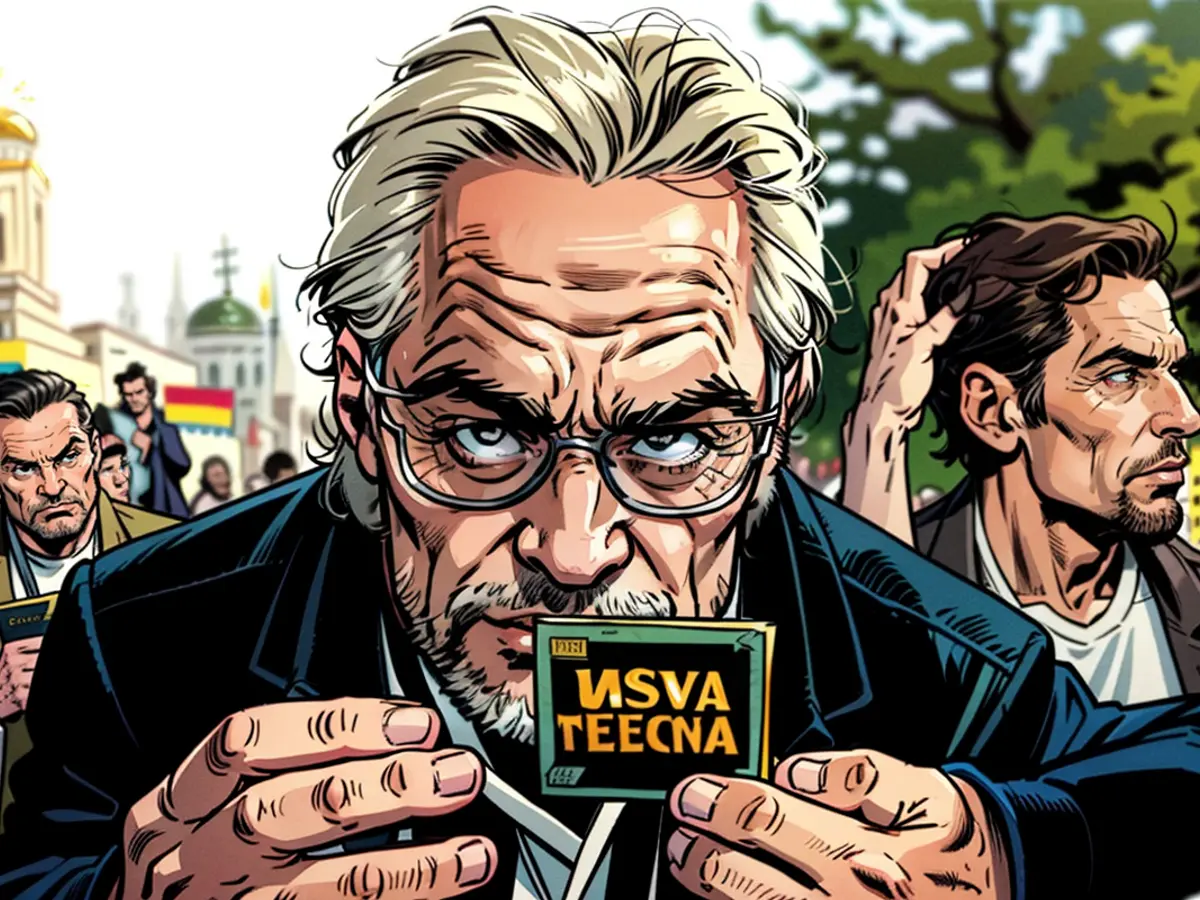
12:50 Russia Declares Capture of Another Village in Eastern Ukraine
In eastern Ukraine, the Russian army claims to have seized another village. "The village of Yelannoe Pervoe (Yelanne Perche in Ukrainian) has been taken," the Russian defense ministry announced. The tiny village lies in the vicinity of the strategically significant city of Pokrovsk, which is threatened by the Russian advance. The Russian army has made rapid progress in the Donetsk region in recent weeks. Russian President Vladimir Putin recently reiterated that the main objective of the Russian army is to capture the industrially significant Donbass region, which includes Donetsk.
12:21 Medvedev Warns of Turning Kyiv into "Giant Melted Spot"
Russian former president Dmitry Medvedev has threatened to turn the Ukrainian capital Kyiv into "a giant melted spot." Russia already has a legal justification for using nuclear weapons due to Ukraine's incursion into the Russian region of Kursk, although it has thus far chosen not to do so. In response to Ukraine's use of Western long-range missiles, Russia could use non-nuclear, newer Russian weapon technology to achieve this, Medvedev stated. Medvedev is the deputy chairman of the Russian Security Council and has repeatedly used harsh rhetoric against the West and Ukraine.
11:50 Sharma: "Intense Fighting Continues Around Kurachove"
The fiercest fighting in eastern Ukraine is currently taking place around the city of Kurachove, as per ntv reporter Kavita Sharma, who is reporting from Dnipro. The decision to use European long-range weapons is causing distress among the population.
11:12 Drone Strikes Cause Damage in Odessa's Black Sea Region
Recent developments reveal details about the extensive drone assault that transpired during the night. Russia dispatched a total of 76 combat drones, with 72 of them being successfully shot down by the Ukrainian air force. Regrettably, there's no available information concerning the aftermath of this attack. The governor of the Black Sea district of Odessa reported significant damage to several structures in the suburb close to Odessa's capital. Debris from these drones led to damage in various buildings, including warehouses in the Ismajil district, a crucial section where Ukraine exports some of its grain. Moreover, certain government structures in Kyiv were also impacted by the debris, but fortunately, there were no reported fires.
10:31 Stoltenberg Reveals Pre-War Dialogue With Russia: Falsified Maps Presented As the NATO Secretary-General during that time, Jens Stoltenberg recalls the last diplomatic encounter between NATO and Russia, which occurred before Russia's invasion of Ukraine in January 2022. Stoltenberg led this fateful meeting at the NATO-Russia Council, where Russia demanded the withdrawal of NATO troops from the eastern region. "That demand was preposterous, nonetheless I uphold diplomacy," he expressed to the "Frankfurter Allgemeine Zeitung". During this meeting, Russia's deputy foreign and defense ministers claimed that there were no war plans, asserting that their nation was imperiled by Ukraine. "They displayed maps demonstrating that Russia is encircled by NATO. Yet, even these maps were erroneous. Denmark, for instance, was not designated as NATO territory on those maps. It was perplexing!" Stoltenberg confesses that he is unsure if these oversights were a consequence of subpar preparation or an intentional act. In retrospect, Stoltenberg acknowledges his remorse for not having taken more measures to bolster Ukraine militarily earlier. He posits that if Ukraine had possessed a more robust military capacity, the entry point for Russia's aggression would have been higher. However, he contends that the ultimate effectiveness would never be known.
10:03 Wiegold on Germano-Lithuanian Pact: Lithuania Views German Combat Brigade as Assistance As part of a government agreement, Germany and Lithuania have sealed a deal that guarantees the deployment of a combat-ready German brigade within Lithuania, a member of NATO's Baltic region. Military strategist Thomas Wiegold delves into the reasons and importance of this accord in an interview with ntv.
09:28 Kim's Ambition: Bolster Cooperation with Russia North Korea's leader, Kim Jong Un, has expressed his determination to strengthen ties with Russia, according to state-controlled media. Following a discussion with Russia's Security Council chief, Sergei Shoigu, in North Korea, state media reported extensively on the dialogue regarding the enhancement of strategic dialogue between the two nations, the reinforcement of cooperation to safeguard their respective security interests, and the regional and global situation. Despite allegations from Ukraine, the United States, and South Korea, North Korea maintains that it has not supplied weapons or missiles to Russia for use in Ukraine.
08:59 Starmer and Biden Ponder Over Extensive Arms Use for Ukraine There is anticipated further deliberation on permitting Ukraine to employ more potent Western weapons against Russian targets. British Prime Minister Starmer announced this decision after a conference with U.S. President Biden, where they postponed their initial decision on the issue. Starmer and Biden will once again discuss it in the upcoming UN General Assembly in New York, with a larger group of participants in attendance. British sources report that Biden is inclined to permit Ukraine to utilize British and French rockets with American technology, although he is hesitant about deploying American-made rockets.
08:23 Zelensky Reassessing Trump's Statements: "Campaign Promises are Campaign Promises" Former Republican presidential candidate Donald Trump has frequently asserted that he could terminate the Ukraine conflict within a single day, but he has never specified his plan. During an interview with CNN, Ukrainian President Volodymyr Zelensky reflects on Trump's statements. "I am unable to decipher this dichotomy as I am unaware of its particulars," Zelensky clarifies in the interview, which is set to air on Sunday. He observes that there is an ongoing election campaign in the United States. "And campaign promises are campaign promises," he maintains. Zelensky also points out that he conversed with Trump two months ago. Throughout this conversation, Trump reassured Zelensky of his support for Ukraine, as according to Zelensky. He describes this dialogue as positively influential.
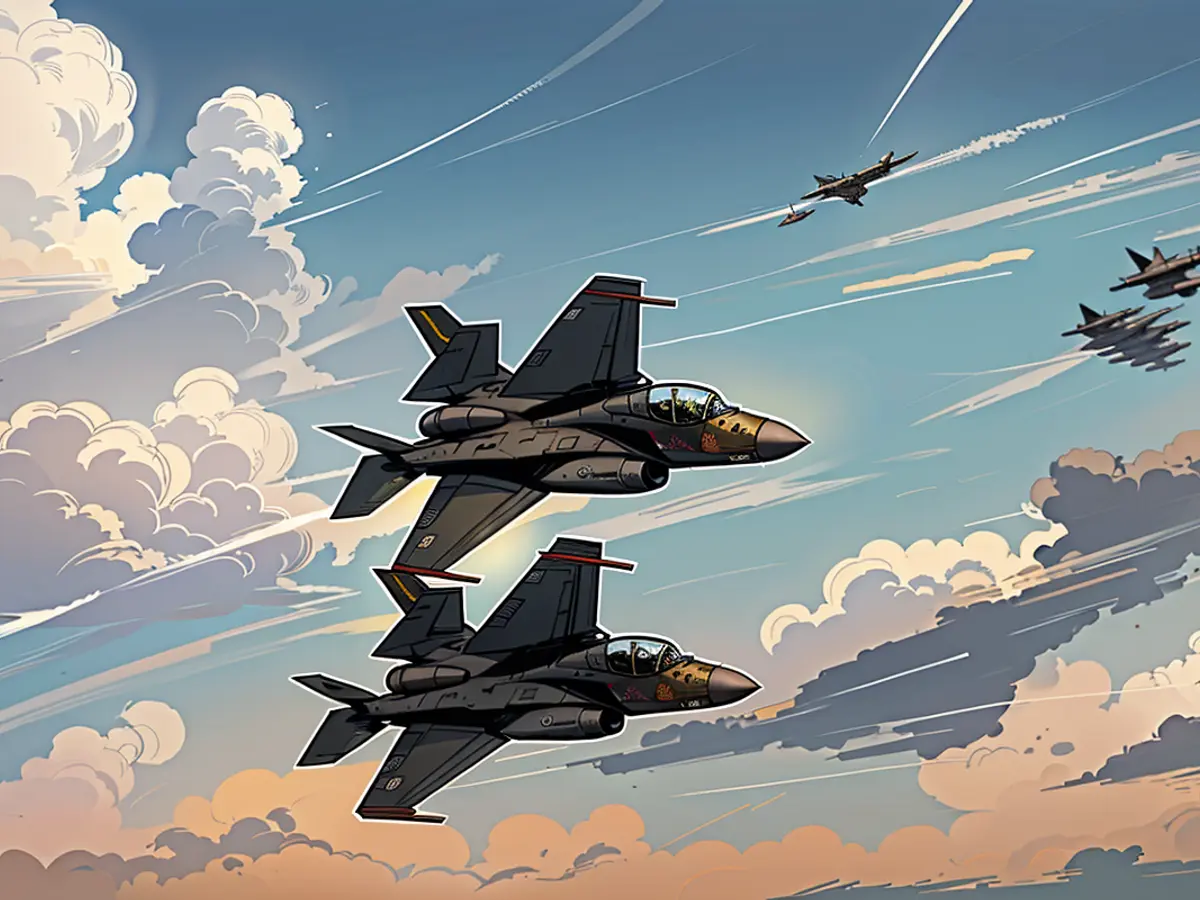
07:27 Kursk: ISW Suggests Need for More Troops and Resources The ISW, an American think-tank based in Washington, acknowledges that Russia is continuing its counterattacks in the Kursk region. However, the ISW does not recognize the existence of a large-scale operation targeted at completely ousting Ukrainian forces from the area. The ISW reports that thus far, Russia has primarily relied on undertrained and inadequately equipped conscripts, along with small contingents of the regular Russian military and other security forces deployed in the border region. In a summary, the think tank states: "If Russia aims to undertake a major operation to dislodge Ukrainian forces from the Kursk Oblast, Russia will likely require additional personnel and resources, beyond what they have already collectively amassed in this region - particularly if the majority of the units present are lacking in combat experience."
06:49 Ukraine Immersed in Drone Assaults during Night Based on reports from the Ukrainian military, Russia conducted a series of drone attacks throughout the night. Russian forces released numerous groups of attack drones, according to the Ukrainian air force, which issued air alerts in virtually every region. For example, in the Odessa region, the navy reported shooting down nine drones. Explosions echoed throughout Odessa's city center, as confirmed by the mayor. Regrettably, there have been no confirmed casualties reported so far.
06:13 Mützenich proposes global dialogue groupGerman SPD leader Rolf Mützenich suggests establishing a global dialogue group to initiate a peace initiative in the ongoing Ukraine conflict. Speaking to the "Rheinische Post", he expresses his belief that it's now time for Western allies to lead a dialogue group to initiate a peace process. "The German Chancellor and Ukrainian President Volodymyr Zelensky agree that now is an opportune time to intensify efforts for peace talks, and that Russia should be included in the next peace summit." Mützenich proposes countries like China, India, Turkey, and Brazil as potential members of such a group, stating that their involvement could facilitate the process.
05:41 EU Ponders Novel Sanctions Extension StrategyAccording to EU diplomats, the European Commission is considering three distinct strategies for the potential future extension of sanctions against Russia. These strategies were shared with European diplomats on Friday, several sources revealed. The reason behind this move is the frozen assets of the Russian Central Bank, which are crucial for the granting of a 50 billion dollar credit from the G7 to Ukraine. These assets have been frozen since Russia's invasion of Ukraine.
03:40 Klitschko: Kyiv Building Hit by Drone DebrisKyiv Mayor Vitali Klitschko announced via the Telegram messaging app that drone debris had impacted a city building in the Obolon district north of the city center. Klitschko added that emergency services were en route to the scene. Earlier, the mayor had confirmed that air defense units had been operational in the capital.
01:35 Kim Jong Un Emphasizes Cooperation with ShoiguNorth Korean leader Kim Jong Un promised to strengthen cooperation with Russian Security Council Secretary Sergei Shoigu. According to the state news agency KCNA, the two men had a detailed discussion during Shoigu's visit to Pyongyang and reached a satisfactory agreement on matters related to increased cooperation to protect mutual security interests. Shoigu, who was still the Russian Defense Minister until May, had initiated closer ties between North Korea and Russia with his visit to Pyongyang in July 2022.
23:36 Zelensky to Present "Victory Plan" to Biden in SeptemberUkrainian President Volodymyr Zelensky has announced a meeting with US President Joe Biden in September. "I will present the plan for victory," Zelensky stated during an appearance in Kyiv. He referred to a series of interconnected decisions that would equip Ukraine with sufficient military power to steer the conflict towards peace. "Such wars of conquest can be justly concluded in one of two ways: either the occupying army is expelled by force or through diplomacy," Zelensky explained. This would guarantee Ukraine's actual independence. However, Kyiv relies on US support to achieve a strong position.
22:59 Russian Attack Shifts SouthwardHeavy fighting continues in eastern Ukraine, according to the Ukrainian military. The General Staff in Kyiv reported 115 engagements in its evening situation report. "The intensity was highest today in the direction of Kurachove, apart from the enemy also being active in the direction of Lyman and Pokrovsk," it stated. Kurachove is a small town south of Pokrovsk. Pokrovsk has long been considered the primary attack target of Russian troops. However, in recent times, the Russians have only managed minimal territorial gains in this area. Instead, they have expanded their attack front southward to capture the mining town of Hirnyk near Kurachove.
22:18 Zelensky: Ukraine's Counteroffensive Achieves Desired ResultsUkrainian President Volodymyr Zelensky claims that Ukraine's counteroffensive in the Russian region of Kursk has produced the desired outcomes. He asserted that the Ukrainian forces had stopped the enemy's advance in the Kharkiv region and that the Russian advance had slowed in Donetsk. He also noted that Russia had not made any significant gains in its counterattack in Kursk.
21:46 Zelensky Regrets Allies' Fear in Aiding UkraineUkrainian President Volodymyr Zelensky criticizes the West for exhibiting "fear" when discussing aid to Ukraine for shooting down Russian missiles. "If allies can collaboratively shoot down missiles and drones in the Middle East, why is there still no comparable decision to shoot down Russian missiles and Iranian Shahed drones in Ukraine's skies?" he asked at a conference in Kyiv. "They're afraid even to admit 'we're working on it'. And this happens even when missiles and drones are literally heading towards the territory of our neighbors," Zelensky contended. "This is a disgrace for the democratic world."
21:30 Russia Uses Over 8000 Iranian Drones in UkraineAccording to the Ukrainian government, Russia has launched over 8000 Iranian Shahed drones into Ukraine since the conflict's onset. There have been no statements from Iran or Russia as of yet. Ukraine first accused the Iranian government of supplying the kamikaze drones to Russia in the autumn of 2022.
20:43 American Blockade on Discussing Long-Range Weapons for UkraineIn the heart of Washington D.C., Prime Minister Keir Starmer of Britain and President Joe Biden of the United States convene for a discussion. The air is ripe with curiosity, hinting at potential updates regarding the authorization of long-range weaponry for Ukraine. Reports from the British "Guardian" suggest that Britain has given the green light for Ukraine to employ Storm-Shadow missiles, but it's widely reported that no such announcements will be made during today's meeting between the two allies. John Kirby, the National Security Council's communication director, voiced his thoughts on the matter, saying, "I wouldn't bet on an announcement today about Ukraine utilizing long-range weapons within Russian territory—definitely not from the U.S." He then proceeded to mention their ongoing dialogues with Britain, France, and other allies regarding the "types of abilities" that would be put at Ukraine's disposal. Kirby avoids committing to any changes in policy, merely acknowledging, "I'm not about to delve into a hypothetical discussion about what we could—or could not—say at a specific juncture."
- The escalation of cyberwarfare between Ukraine and Russia could potentially lead to severe consequences for both nations, as shown by Russia's sabotage of the Nord Stream pipeline and Ukraine's alleged hacking of Russian infrastructure.
- Urgent discussions regarding cyberdefenses must be held globally to prevent the further use of these powerful digital tools in conflicts and ensure the protection of critical infrastructure, in light of the increasing danger of cyberwarfare.
